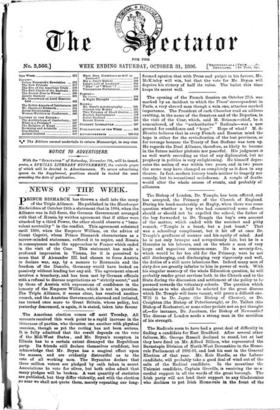The opening of the French Session on October 27th was
marked by an incident to which the Times' correspondent in Paris, a very shrewd man though a vain one, attaches marked importance. The President of each Chamber read an address exulting, in the name of the Senators and of the Deputies, in the visit of the Czar, which, said M. Brisson—chief, be it remembered, of the " authoritative " Radicals—was a new ground for confidence and "hope." Hope of what? M. de Blowitz believes that in every French and Russian mind the hope is either for the revindication of the lost provinces, or for revenge because the Treaty of San Stefano was torn up. He regards the Dual Alliance, therefore, as likely to become in the future neither platonic nor peaceful. His judgment is as well worth recording as that of any diplomatist, but no prophecy in politics is very enlightening. He himself depre- cates the notion of war within two years, and in two years the scene may have changed as completely as it does in any theatre. In fact, modern history tends neither to tragedy nor comedy, but to sensational melodrama. A couple of deaths would alter the whole course of events, and probably all alliances.










































